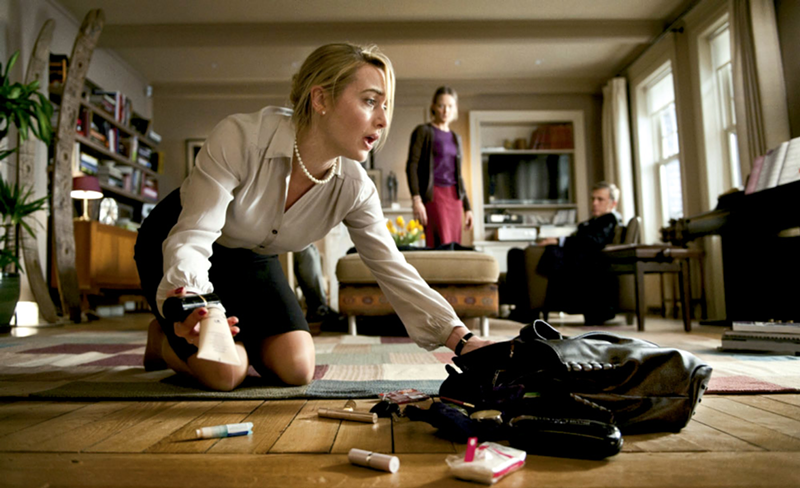It seems fitting to note that Carnage, the new film from Roman Polanski, is an adaptation based on Yasmina Reza’s play Le Dieu du carnage, which translates in English to God of Carnage. Reza penned the screenplay, and much attention was paid to the omission of the “God of” as Carnage arrived in theaters.
As the universe expands under the direction of Polanski, as the walls collapse — well, not really, because except for a bird’s eye prologue and coda gazing down on a New York City schoolyard, the audience is locked either inside a tightly configured apartment or the hallway approaching the elevator (and the tantalizing promise of escaping into that great wide world just off the stage) — we begin to realize the effect is quite the opposite. Everything contracts. The world, the inciting incident, the response, it all seems small and the players small-minded.
Two sets of New York parents come together for a private mediation session as a result of a playground dispute between their sons, which left one of the boys with dental trauma after a vicious skirmish involving a baby Ruthian swing of a fallen tree limb. The son of Penelope (Jodie Foster) and Michael (John C. Reilly) sustained injury and eagerly invite Nancy (Kate Winslet) and Alan (Christoph Waltz) to negotitate a peaceable settlement that none of them seems to believe the boys could reach on their own.
This should be candy, a dark and bitter chocolate morsel for Polanski, because the root of the play is all about the darkly brutal and childish nature of Man. We have evolved into civilized beings, sentient creatures with a sense of our own humanity, a respect for the rights of others and an appreciation for the rules and laws we have agreed to let bind us together, but we are not so far removed, are we, from our more primitive selves, the bite-strike-shoot first mentality, the kill or be killed survivalist urges.
Polanski, in Death and the Maiden (1994), another adaptation, this time from an Ariel Dorfman play about a political activist (Sigourney Weaver) who comes to believe that a guest (Ben Kingsley) in her home had once tortured her and decides to turn the tables on him, presented the feral intensity of a psychological and physical battle of wits and wills and made us feel the salt rubbed in those terribly raw wounds. There was danger and doubt lurking in every exchange because the two sides (and the audience as well) were striking from one-eyed, half-blind positions that felt real and urgent.
That sense is part of what is missing from Carnage. The parents have overstepped their bounds, seeking to settle a dispute between children from the world of children. By intruding here, they have not brought higher reason to bear; rather, they have lowered themselves, reverting back to the pettiness of childhood — the sticks and stones and crude oneupsmanship that they should have grown out of along the way. They have moved further away from the enlightenment we seek from a higher power or even the absolute rendering of power that might settle the dispute.
The play is supposed to be a comedy, a masterful skewering of adult sensibilities, and the possibility for comic revelation seems more obvious in the original Broadway cast (Jeff Daniels, Hope Davis, James Gandolfini and Marcia Gay Harden, all of whom were nominated for Tony Awards, with Harden winning Best Leading Actress), but Polanski and his stellar ensemble heavily underline the sneeringly dramatic vanity of these flimsy stock characters so much that the audience will beat a hasty retreat, except for those faithful few who are hopelessly enamored with an individual performer or two and are willing to follow them off the cliff. I wanted to hang in there and support any and all of them (because each in their own way has thoroughly enchanted me elsewhere), but I think I was put off moreso because I knew these characters too-well. They are who we have become — full of empty righteousness and pseudo-intellectual leanings backed up by nothing, not even enough hot air to keep our pompous thought balloons afloat.
Not only is the “God of” missing here, but Polanski’s version of Carnage is definitely lower-cased and proof that we are getting smaller and smaller every second.
Grade: C





